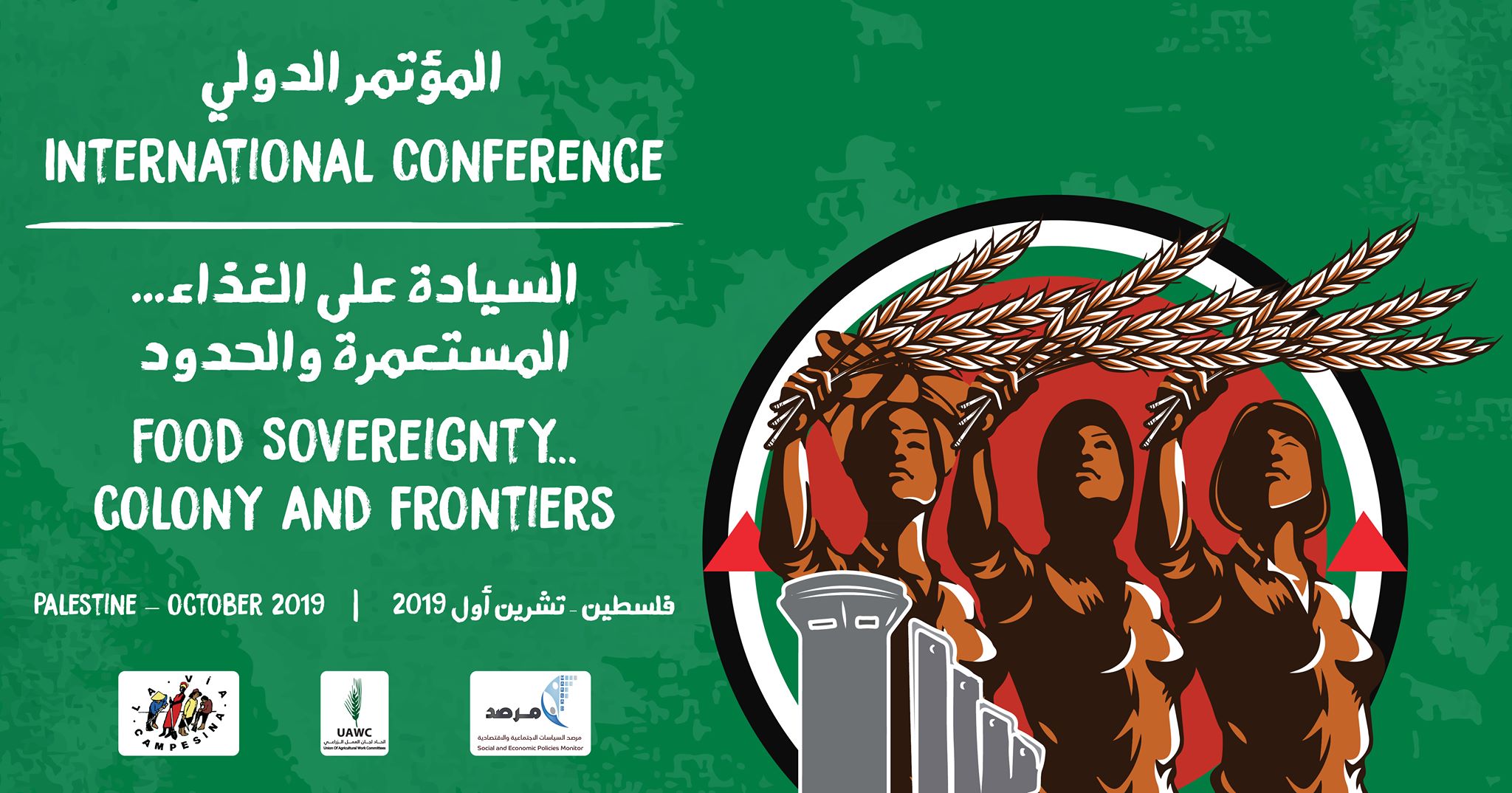Our partners Social and Economic Policies Monitor (AL-MARSAD) and The Union of Agricultural Work Committees (UAWC) in cooperation with La Via Campesina concluded the international conference entitled “Food Sovereignty … Colony and Frontiers”. Here is the Closing Statement for the conference:
We close with you the international conference entitled “Food Sovereignty … Colony and Frontiers” here in Ramallah along with our colleagues in Gaza Strip, which was organized by the Social and Economic Policies Monitor (Marsad), the Union of Agricultural Work Committees and La Via Campesina.
We appreciate the attendance of a group of prominent speakers representing social farmer movements from fourteen countries. We also value your patience and cooperation in making this conference a success. We were able to gather in one location that hosts liberation farmer movements from Latin America, Europe, Africa, the United States and Palestine, which included those keen on peoples’ interests and rights. We also value the interventions of our colleagues and friends, academics and representatives of agricultural movements from Arab States. As such, this conference was a fruitful experience full of lessons learned from the experiences presented during the conference in presence of 800 attendees from different social categories and classes, particularly farmers, who positively interacted and participated in the discussions.
Through this conference, our goal is to find an environment rich with national and international experiences through which the mechanisms and methods that contribute to realizing food sovereignty were presented. We also addressed the detrimental roles of colonialism and imperialism, as well as their role in seeking to abolish our food sovereignty as peoples. Under this umbrella. We gathered a number of active bodies on the social and agricultural fronts, where the nature of the national and international challenges faced were discussed. Due to the urgent need that requires promoting networking, coordination, cooperation and exchange of expertise between Palestinian social-agricultural movements and active international ones, which would contribute to improving the reality of social farmer movements in the future, particularly by increasing their contribution to the national liberation struggle, and in realizing social justice, defending the rights of the poor and marginalized and the public in general through establishing the concept of food sovereignty.
The attendees agreed upon a number of important recommendations that would lead to improving agriculture internationally, regionally and locally. Following are the most important of such recommendations:
- International solidarity with the Palestinian struggle for sovereignty over their land and natural resources;
- Pressure governments to adopt the UN Declaration on the Rights of Farmers and Rural Workers through defending the rights of peasants and fishermen;
- Governments must ensure fair distribution and fair collection, as well as ensure fair input for food production, which guarantees the continued production of small-scale farmers. This is realized through the unity of social liberation movements that call for socio-economic justice, including farmer movements from around the world, in order to work together on ending the international imperial tyranny and capitalism that steals the resources of farmers around the world, and to end the monopoly of major companies that control production inputs and pressures policy making in favor of capital holders;
- The exchange of expertise is a particularly important matter. Exchange of expertise must be obtained and acquired at all times, and the communication network between liberation farmer movements must not end;
- International bodies must assume their responsibilities and urge and contribute to the establishment of infrastructure in rural areas. This would set the grounds for a future consumer base that protects farmers from diminishing irrigation water around the world, at a time when rain water in Palestine is wasted;
- Returning to original mechanisms, such as environmental agriculture and indigenous seeds is of great importance. We must focus on them in our free path to ensure access to a general state of food sovereignty;
- Raise awareness on the concept of sovereignty over resources, particularly food, and on how to realize food sovereignty. This is achieved through including such a concept in all plans and programs of all organizations and actors in developmental fields;
- Introduce the concept of food sovereignty in the concepts of food security, because food sovereignty applies on the Palestinian case, as the issue is political and the Israeli occupation stands between Palestinians and their resources. The concepts of food security are social concepts that do not address the root causes behind the lack of food security in Palestine, and only discuss the availability of food for people;
- Decision makers, particularly the Palestinian government if it is serious about separation from the Israeli economy, must immediately take practical steps that demonstrate the seriousness of their endeavors through reviewing all relevant laws and policies by including the concepts of sovereignty over food and resources in line with the Palestinian need for actual national policies that lead to promoting the resilience of Palestinian farmers and people in their land, particularly in “C” areas;
- The policy needed is an original national policy that is not copied from any other state or experience that does not apply to the Palestinian one, a policy the is based on resilience and initiative and presented as part of the Palestinian project resisting and challenging the annexation project that is in the horizon. This is realized through the development of a national policy that contributes to protecting Palestinian land;
- Activate legal follow-up, lobbying and advocacy mechanisms broadly to protect farmers, fishermen and rural workers who are subject to horrendous violations through continued assault against them by demolition and confiscation of land and facilities;
- Prosecute the occupation at the international level in order to hold it accountable, expose it and reveal its true identity, which will contribute to protecting confiscated and violated Palestinian resources by the occupation;
- “Food Sovereignty … Colony and Frontiers” conference has established the grounds for a new phase of struggle amidst Palestinian actors and activists, which relies on the importance of prioritizing food resources in the struggle against monopoly, greed and capital control over people’s means of living. This is realized through the provision of support to Palestinians to maintain their land and promote their ability to face major investors running well connected companies against numerous international development agencies, which contributed to destroying the dreams and projects of small-scale farmers;
- The notable attendance of a number of organizations and movements struggling for food sovereignty and justice for farmers, fishermen and agricultural workers around the world, led by La Via Campesina, is proof of the just struggle of Palestinian farmers and an important and major opportunity to launch the biggest lobbying and advocacy campaign on the international level to convey the struggles of Palestinian farmers to the world by ensuring the importance of boycotting the occupation products; and
- Decide on an international day for solidarity with Palestinian fishermen.
Long live the struggles of our farmers… long live the struggles of agricultural workers… we stand with you until socio-economic justice is realized for farmers, fishermen and agricultural workers.
May we succeed in protecting the rights of farmers and rural workers around the world, in our Arab World and in our beloved Palestine.









